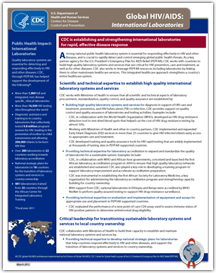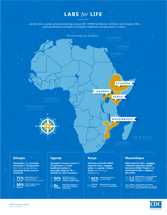Building High Quality Laboratories
Public Health Impact: International Laboratories
Quality laboratory systems are essential for detecting and responding effectively to HIV and other diseases. CDC, through PEPFAR, has helped support the development of the following *:
*Fiscal year 2011 unless otherwise indicated

Download our International Laboratories Fact Sheet for more details.
CDC is establishing and strengthening international laboratories for rapid, effective disease response
A strong national public health laboratory system is essential for responding effectively to HIV and other diseases, and is crucial to rapidly detect and control emerging global public health threats. As a key partner agency for the U.S. President’s Emergency Plan for AIDS Relief (PEPFAR), CDC works with countries to build high quality laboratory systems and services that are critical for HIV prevention, care and treatment, as well as for other diseases. CDC also works to leverage PEPFAR resources including laboratories by linking them to other mainstream healthcare services. This integrated healthcare approach strengthens a country’s entire healthcare system.
Scientific and technical expertise to establish high quality international laboratory systems and services
CDC works with Ministries of Health to ensure that all scientific and technical aspects of laboratory procurement, standardization, quality control, and quality assurance are established by:
Building high quality laboratory systems and services for diagnosis in support of HIV care and treatment, prevention, and HIV/tuberculosis (TB) co-infection. CDC provides support on quality control and quality assurance of laboratories and testing activities.
Providing technical expertise for laboratory accreditation to expand and standardize the quality of laboratories for a sustainable system.
Providing technical expertise on evaluation and implementation of equipment and assays for appropriate use and placement in PEPFAR-supported countries.
Critical leadership for transitioning sustainable laboratory systems and services to local country ownership
CDC collaborates with Ministries of Health to build their capacity to establish and maintain national laboratory systems and services by:
Providing technical expertise to develop national strategic plans for laboratories that help countries respond effectively to HIV and other diseases, and support the transition of laboratory systems and services to country ownership.
Providing on-site training and mentoring to develop a qualified local workforce capable of managing efficient laboratories that support quality assurance systems and timely, reliable testing.
Notable Accomplishments
CDC, in collaboration with the WHO Regional Office for Africa and 12 African governments, developed and implemented the first African laboratory accreditation program to provide better training and expand testing capacity.
CDC was instrumental in establishing the first-of-its-kind African Society of Laboratory Medicine (ASLM) in collaboration with WHO, Ministries of Health, the African Union, and other partners.
CDC helped establish the African Centre for Integrated Laboratory Training in Johannesburg, South Africa, which serves as a regional training center to increase the pool of laboratory technicians and health care workers trained in HIV and tuberculosis diagnostics throughout Africa.
To further promote country ownership while building capacity, CDC has partnered with Ministries of Health to support the development of national strategic plans for laboratories.
CDC has established a standardized program to validate new HIV rapid tests for potential use in PEPFAR-supported countries. The program is unique in that it uses a large panel of well characterized specimens from all over the world to assess test performance.
Studies show that, left unidentified and untreated, 50-60% of HIV-infected infants die by age two. CDC led the development of the Early Infant Diagnosis (EID) testing procedure that gives HIV-infected infants early access to diagnosis and appropriate care and treatment.
In Asia, Central America, and Africa, CDC provided technical support and training to 18 countries for HIV drug-resistance testing.
As more persons are identified as HIV-positive and receive antiretroviral treatment, there are pressing needs to monitor the viral load. Typically, viral-load testing requires human plasma but CDC is leading the push towards using dried blood spots (DBS) in resource-limited settings.
Labs for Life Infographic:

Get email updates
To receive email updates about this page, enter your email address:
Contact Us:
- Centers for Disease Control and Prevention
1600 Clifton Rd
Atlanta, GA 30333 - 800-CDC-INFO
(800-232-4636)
TTY: (888) 232-6348
24 Hours/Every Day - Contact CDC-INFO
 ShareCompartir
ShareCompartir


